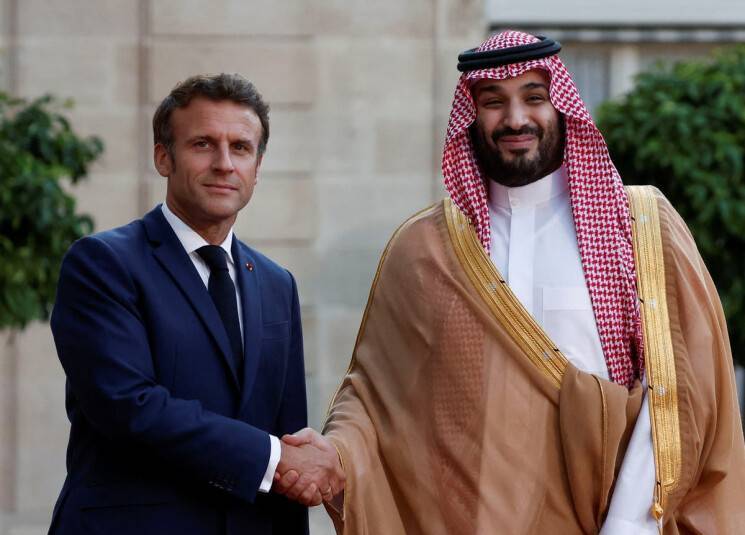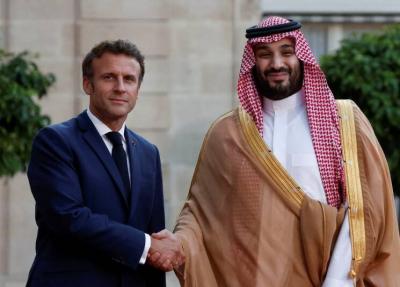The confirmation by French President Emmanuel Macron and Saudi Crown Prince Mohammed bin Salman of their intention to work together to help extricate Lebanon from its deep crisis is not just an empty statement. Optimists about the external movement for Lebanon believe this message is serious and sends a strong signal to the Lebanese interior at a critically important time, as the region witnesses significant transformations and a de-escalation of tensions across multiple arenas. This situation calls on the Lebanese to engage with the French president and the Saudi crown prince in their renewed efforts to find an emergency exit from the blocked presidential tunnel and provide a new dose of oxygen to the presidential file, potentially rescuing it from the state of clinical death it has been in for the past five months, and establishing a way out for Lebanon from a situation that has become pitiful, while revitalizing a population that the crisis has effectively handed a one-way ticket to hell.
It is noteworthy that this message reflected in the communication between Macron and MbS came just days before a French-Saudi bilateral meeting in Paris in mid-March, during which the two sides could not reach a common ground regarding the presidential file in Lebanon. In clearer terms, both the French and the Saudi sides remained at opposite ends regarding the presidential file, with each having a different perspective. The recent quintuple meeting in Paris highlighted this divergence clearly, where Paris adopted the equation of Sleiman Frangieh as president and Nawaf Salam as prime minister, while Riyadh categorically contradicted this equation. This contradiction was reiterated during their last meeting in Paris just days ago, and the meeting ended without either side being able to draw the other to its position. Therefore, the contradiction between them remained unresolved.
This raises a two-part question: Firstly, on what basis will the Saudi-French endeavor be initiated, and how can it help resolve the presidential file? Secondly, are the French and Saudi sides confident that they can break through the internal stalemate leading to the election of a president?
Regarding the first aspect, there are four possibilities:
1. The French-Saudi effort may be based on a change in the Saudi position, moving closer to the French-supported Frangieh-Salam equation. But is there anyone who believes that Saudi Arabia is inclined to this? Conversely, some expect the opposite; France today is not the France of yesterday, thus it is not out of the question for France to align with the Saudi position rather than the other way around.
2. The endeavor could be based on Paris abandoning the Frangieh-Salam equation and adopting the Saudi stance, which would entail moving toward other presidential options that receive the kingdom's blessing and support. However, is Saudi Arabia the only player in the presidential arena capable of imposing a candidate deemed suitable for the presidency? The same applies to France.
3. The anticipated French-Saudi initiative might stem from a mutual conviction that passing certain names is impossible, meaning a suitable solution would be to open the door to other presidential options, or more precisely, to allow competition between candidates, with the one receiving the majority winning. However, if that is the case, how will these "other options" be marketed internally, especially among those who have already identified their final candidates for the presidency, or among those who consider themselves the lords of the Maronite arena with the final say in determining the identity, form, specifications, program, and type of the president?
4. The Saudi-French initiative may begin from the premise that any external movement cannot succeed in imposing a president on the Lebanese or even obliging them to agree on one. This would mean continuing along the same path both sides have taken from the beginning: providing moral support from afar, continuing to encourage the Lebanese, urging them, and hoping they will resolve their constitutional obligation and elect their president.
From what has been presented, it seems that the fourth option—offering assistance through encouragement and distant wishes—is the most realistic approach.
As for whether Saudi Arabia and France can break the internal paralysis with a presidential solution, there is no doubt that Macron and MbS's declaration of their intent to help has delighted many in Lebanon who are optimistic that a presidential solution is on the horizon and that electing a president is just a stone's throw away.
However, alongside this optimism, there is a reality that must be reflected on before rushing to simplify the expected endeavor from the French president and Saudi crown prince, formulating hypotheses that mirror wishes and exceed or contradict the existing complexities on the ground.
Internally, the hypothesis may hold that the message calls on the parties and movements responsible for the presidential deadlock to accompany this momentum by seizing the renewed French-Saudi opportunity and preparing a suitable ground for positive interaction with the joint endeavor. However, this message, despite its importance and necessity, has fallen on a Lebanese reality that preemptively undermines any external movement or effort. This effort does not hold any obligatory qualities, especially since the parties responsible for the deadlock have established an unbreakable ground within, driven solely by twisted minds and destructive calculations. None of its proponents seem ready to relinquish their hold, but rather fortify it around the clock with political rhetoric that has sunk to its lowest levels, exacerbating distances among internal components, deepening the rift in the country, and thus rendering the election of a president an elusive mirage.
Therefore, is there anyone rational enough to assess or assume or believe that any external initiative, be it from friends or allies, regardless of its form, size, or supposed benefits, can easily operate within the wreckage of savage parties and movements that belong more to external influences than to their own nation? These parties and movements have mastered the art of sounding off to outsiders and obfuscating in the interior, presenting the worst model on Earth in terms of competition, hatred, and lost opportunities. If they were fortunate enough to possess self-generated or borrowed power, they would not hesitate to devour themselves or each other.
In conclusion, internal complexities are more powerful than the capabilities and potentials of the external to impose solutions, and thus the presidential file will remain mired in the bazaar of obstruction, awaiting a miracle that will not come.




